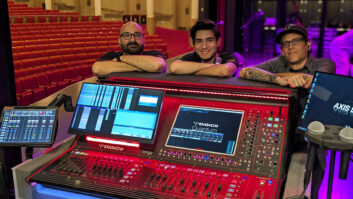Standards Becoming Goal for Industry Groups
Dec 28, 2006 8:00 AM,
By John McKeon
The recent dustup among InfoComm, CEDIA, and NSCA over promotion of rival certification structures is just one aspect of a broadening industry-wide effort to bring uniformity and clarity to the matter of professional qualifications and credentials.
Recently, all of these groups have announced new initiatives in this area. InfoComm plans to become a national standards development organization accredited by the American National Standards Institute (ANSI), and will also seek ANSI accreditation for its Certified Technology Specialist (CTS) credentials program.
In many industries, successful voluntary, consensus-based standards programs have long been seen as a good alternative to increased government regulation in the form of personnel licensing or more extensive control over product specifications and performance.
In addition to staving off government incursions into business, though, effective standards programs can be a pro-active approach to marketplace demands that affect all vendors and service providers equally, such as concerns for safe operation of equipment and a reliably qualified workforce. That’s why so many companies have been willing to put aside their normal competitive and proprietary policies and collaborate to tackle problems too broad for any player to overcome.
Workforce development is a prime arena for such cooperative efforts, because AV’s ultimate customers need assurance of the qualifications of the people working on their projects, while integrators and other industry employers feel a need for an easy and dependable way of verifying applicants’ experience and capabilities.
InfoComm’s CTS program provides certification in both general and specialized areas. The goal, still, is to assure both employers and clients of the knowledge and skills of the people with whom they may be working.
ANSI is affiliated with the International Organization for Standardization (ISO) and accredits professional certification programs under ISO/IEC 17024. ANSI states that more than 300,000 professionals in a variety of industries now hold credentials issued by ANSI-accredited programs.
ANSI says its accreditation is “based on an internationally recognized process for accrediting organizations and it has been used by ANSI for many years. This process involves both a review of a paper application and the performance of an audit (on-site visit) to validate information provided by each applicant. The use of an onsite audit for accreditation of personnel certification agencies is unique to ANSI.”
InfoComm is also seeking ANSI accreditation to become a standards-setting body itself, developing industry consensus norms for system performance. “InfoComm has already assembled a substantial body of knowledge through the development of its courses and best practices manuals, which makes becoming an ANSI standards-setting organization a logical next step,” says InfoComm Executive Director Randal A. Lemke, Ph. D.
Meanwhile, NSCA and CEDIA joined the Consumer Electronics Association (CEA) in launching a new Electronic Systems Professional Alliance, hiring an industry veteran as its managing director. ESPA says it hopes to begin rolling out education and certification programs late in 2007, with the goal of helping to “standardize the terms, definitions, and best practices of the electronic systems industry, and ensure broad-based inclusion of critical concepts for entry-level technicians.”
ESPA has recently called on organizations and businesses in the electronic systems industry to become “affiliates” and participate in the development of its education and certification programs. NSCA’s Chuck Wilson, who serves as chair of ESPA’s board of directors, calls the ESPA initiative “a powerful, unifying force for the electronic systems industry.”









